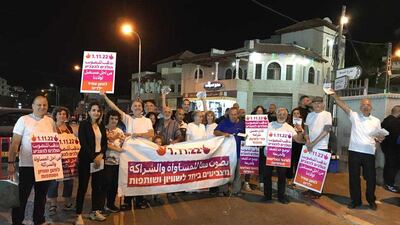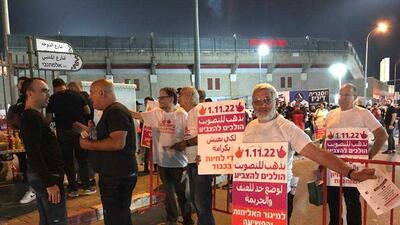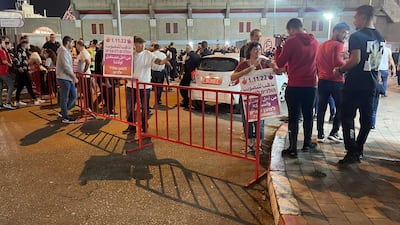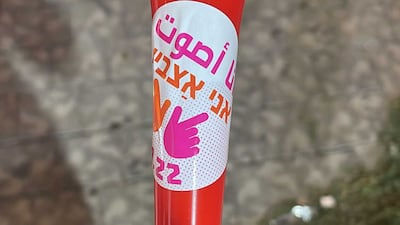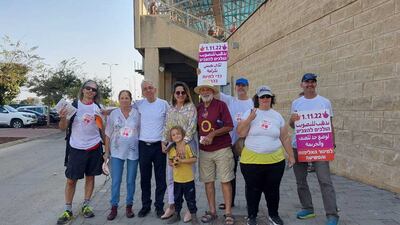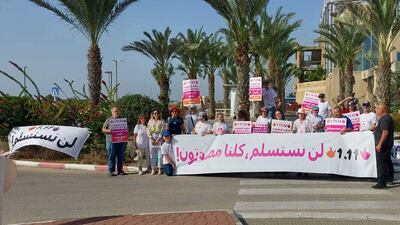Two hours before the kick-off between Israeli second division football teams Hapoel Umm Al Fahm and Maccabi Ahi Nazareth, Suheil Diab and his fellow volunteers were busy unfurling banners and unwrapping vuvuzelas in the car park of Acre’s football stadium, in the north of the country.
They were up and ready long before the trickle of supporters started to arrive.
The group, Going Together To Vote, was made up of Arab and Jewish campaigners who were trying to encourage Israel’s Arab community to participate in Tuesday's elections.
Mr Diab said the match between two Arab teams was a perfect chance to tell his community why he chooses to vote and why they should, too.
“I am a Palestinian citizen of Israel. I think the interest of our society is to participate more in elections and bring more representatives for Arabs in the Knesset,” he said.
“Our organisation is unique because it is a collaboration of Arabs and Jews,” he said, flipping over a bilingual pamphlet.
“The messages we try to convey in Arabic we do in Hebrew, too. Most of the main parties in Israel are talking to either Jews or Arabs, not both at the same time. This separation has been forced on us since 1948. We want to change it.”
For Mr Diab and his colleagues, the first step in doing so is “starting from the grass roots of Jewish and Arab communities, underpinning our messages with the common principles of peace equality and social justice”.
Rather than just ideological, he also highlighted the immediate technical importance of the Arab vote during these elections.
“Through better democratic participation, Arabs and Jews can come together to conclude the endless cycle of elections that we have seen during the past three years.”
Tuesday's vote is the fifth in four years after repeated failures to form governments or keep them stable to the end of their terms. Analysts said that failure to deliver a clear winner could put Israel on course for a sixth round of voting.
Participation of Arab Israeli and Palestinian Israeli voters is low — while they make up about 20 per cent of Israel's population, polls show less than half plan to cast a ballot. That figure is down significantly from 2016's 63.5 per cent turnout for the community.
But Going Together To Vote puts on a brave face.
They say they fear the rise of far-right politicians, a number of whom have enjoyed soaring popularity in this campaign.
Itamar Ben-Gvir is running on a manifesto that includes the complete annexation of the West Bank and the formation of a government body to encourage Palestinian migration.
If Mr Ben-Gvir’s opponents fail to win enough seats on Tuesday, he still stands a good chance of being part of Israel’s next government. Therefore, they see the Arab vote as essential in preventing this.
Arab political leaders have been campaigning hard, imploring the community to vote.
“I am certainly aware that most members of Arab society want the extreme right to remain in the opposition,” Mansour Abbas, leader of the Arab party Ra’am and the first Israeli Arab party member of an Israeli Cabinet, said on Sunday.
Some at the match outside the stadium in Acre are receptive to this message.
But that is not always the case. In Acre’s old city, a half-hour walk away, the reception in the run-up to the election was less warm.
Itamar, one of the group’s volunteers, said he is still shaken by the experience as he explains people were shouting at him that they would not take part and nor would their families.
“Honestly, we felt resentment. People were hurting. You could see the pain in their eyes. Staring at me, knowing I was Jewish, they considered me as part of the problem,” he said.
And even in the calmer atmosphere in the stadium’s car park, some in the crowd still expressed reservations.
While Itamar was setting out a detailed survey of how Israeli politics went wrong in recent years, two Arab teenagers came over to ask which party Going Together To Vote was campaigning for.
“We don’t want you to vote for a particular party, we just want you to vote full stop,” Itamar told them.
The boys asked him what he meant.
The exchange highlights the challenge for groups like Going Together To Vote. They face not just voter fatigue after multiple rounds of voting but are trying to overcome deep suspicion and distrust of the entire system.
Itamar said he is sticking to his cause.
“We are in this together. Israel needs its Arab voters to keep the far-right out. I, a liberal Zionist who cares about the future of my country, need them personally. There may not be a second chance,” he said.
When the crowd had passed into the stadium, the campaigners started to pack up as the drumbeat and cheers from inside grew louder and the game began.
In the end, the Arab supporters got a lively match in which a player was sent off and a 3-0 victory for Hapoel Um El Fahem was the result.
The committed members of Going Together To Vote, along with all liberals in the country, will be hoping for a similar rally from Arab voters to head off the far right and prevent the need for a further election.
